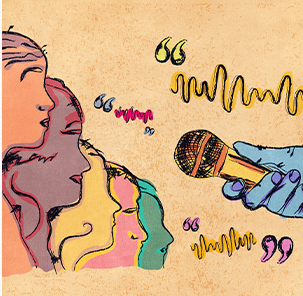Subscribe and receive the best Inkyfada podcasts straight to your mailbox.
Don't miss out! Subscribe to our newsletter to receive the latest Inkyfada podcasts.
Thanks for your inscription
Unsubscribe at any time

The Great Discord and the early reign of the Umayyad Caliph Muawiya I diverted the Arabs of Ifriqiya for more than a decade. However, it was the exarch of Carthage, Gennadios, who was chased out by the troops of the Byzantine emperor, who would seek the help of Muawiya to regain his power in Africa.
The Caliph then sent an army under the command of Muawyia Ibn Hodeyj, a veteran of the Egyptian conquest who was loyal to him. In 45 AH, he established a military base named Kairouan on the flank of the Baten Al-Qarn mountain, managed to repel the imperial Byzantine fleet at Sousse and conquered several strongholds in Byzacene, including that of Cellulis (Ain Jloula), further north (Bizerte, Cap Bon) and south (Djerba).
During these battles, two military leaders would stand out who, much later, would dispute the Caliphate in the East during a bloody civil war: Abd Al-Malik Ibn Marwan and Abdallah Ibn Zoubeyr. Five years later, Caliph Muawiya I rearranged his pawns on the chessboard of his caliphate to ensure the succession of his son. He thus appointed Ibn Hodeyj as governor of Egypt and sent Oqba to Ifriqiya. Oqba Ibn Nafaa took advantage of this to establish a military city modeled after Basra, Kufa, and Fustat. Built in Gamonia in 50 AH/670 CE, in a plain not far from the abandoned Kairouan of Ibn Hodeyj, this city, which became holy several centuries later, did not escape the tradition of founding myths.
We are pleased to have as our guests, Mr. Fathi Bahri, historian and archaeologist specializing in the Middle Ages, former director general of the INP, Mr. Mohamed Ben Abbes, historian specializing in Late Antiquity and Early Middle Ages, Mr. Mohamed Hasan, historian specializing in the Middle Ages, and Mr. Faouzi Mahfoudh, archaeologist and historian specializing in Islamic art and architecture and former General Director of the INP (National Heritage Institute).
*The podcast director extends his sincere thanks to the honorable professors Adnan El Ghali and Nouri Boukhchim.
Inkyfada Podcast is the first platform entirely dedicated to original Tunisian podcasts, and was conceived by Inkyfada media in collaboration with the in-house research and development laboratory, InkyLab. Inkyfada joined the global podcast boom in 2017, when the team produced the first Tunisian audio documentary, diving deep into the belly of the El Kamour struggle taking place in the desert. Since then, Inkyfada Podcast has produced a wide variety of documentaries, investigations, and podcast series, as well as articles accompanied by music; covering a multitude of contemporary issues in order to offer an immersive and alternative podcast experience. Whilst exclusively offering audio content, the Inkyfada Podcast team upholds the same core values and principles of inkyfada.com, and is committed to producing high quality content though a dynamic and meticulous production process. In addition to the permanent team, Inkyfada podcast works closely with various journalists, artists, illustrators, musicians and other content creators in order to diversify the platform and support artistic creativity. These podcasts differ from traditional radiophonic content in that the applied production and editing process is more akin to cinematographic techniques, in addition to being web-based, downloadable and accessible on demand. Additionally, Inkyfada Podcast uniquely offers subtitles in French, Arabic and English for all audio content, the majority of which is recorded in Tunisian or in the preferred language of the speaker in question.